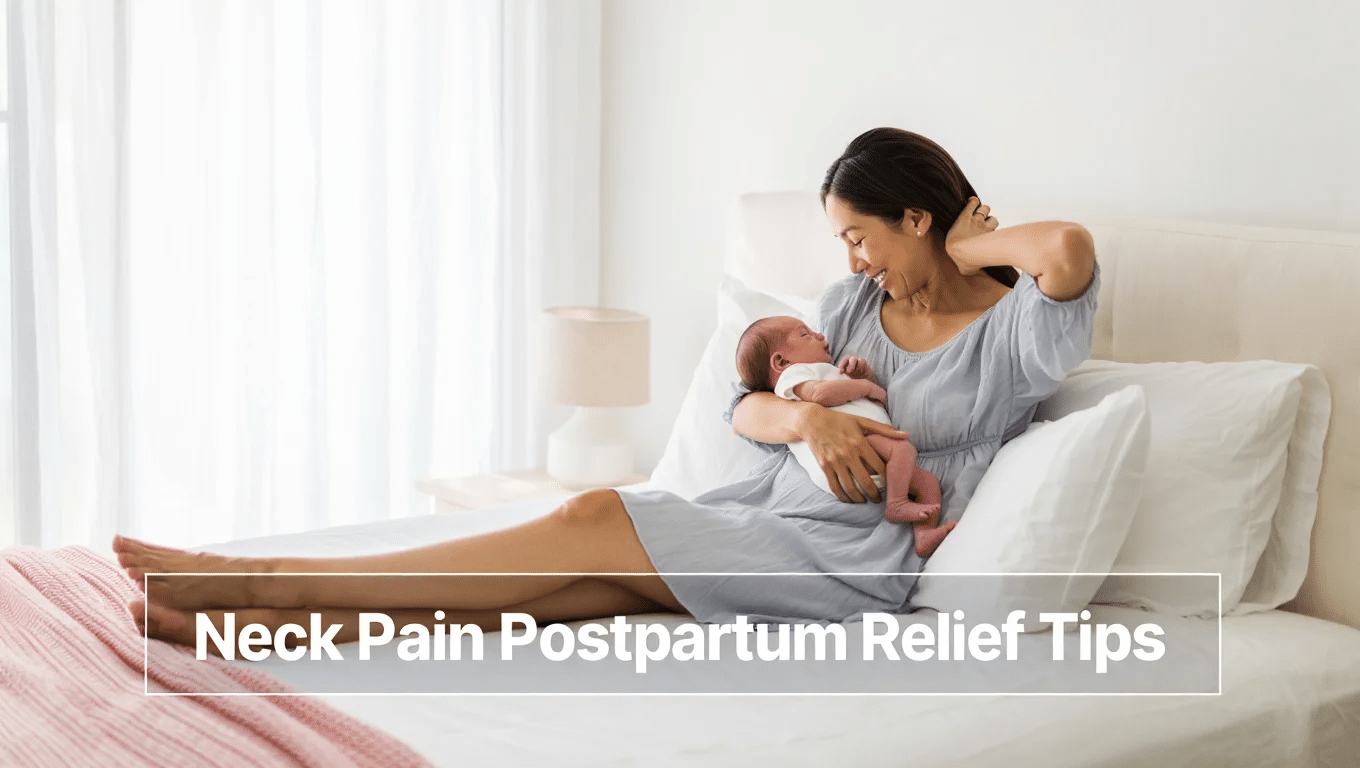
Welcoming a precious new baby brings countless joyful moments, but it can also bring unexpected physical challenges that many new mothers don’t anticipate.
Among these, postpartum neck pain has become an increasingly common complaint for many new mothers.
The countless hours spent looking down at your little one, maintaining awkward breastfeeding positions, and those long nights cradling and rocking your baby can leave your neck stiff, sore, and sometimes in severe pain.
If you’re experiencing this discomfort, you’re certainly not alone! This guide will walk you through what postpartum neck pain is, why it happens, and simple yet effective ways to find relief without leaving home.
With practical tips, easy exercises, and expert advice, you can ease your discomfort and focus on what truly matters – enjoying those special, fleeting moments with your newborn.
What is Postpartum Neck Pain?
Postpartum neck pain refers to the discomfort, stiffness, or soreness in the neck that many women experience after giving birth.
This pain typically starts in the first few weeks after delivery, when mothers spend long hours feeding, holding, and caring for their newborns. The neck pain often feels like a dull ache, stiffness, or sharp pain that may radiate to the shoulders and upper back.
Most commonly, this pain begins within the first two months after childbirth as mothers adjust to new caregiving positions.
However, in some rare cases, neck pain can actually start during late pregnancy as the body prepares for birth and releases hormones that loosen ligaments.
This loosening, while necessary for childbirth, can sometimes affect the stability of the neck and spine, leading to discomfort even before delivery.
Postpartum Neck Pain vs Upper Back Pain

Many new mothers experience both neck and upper back pain during the postpartum period, but these conditions affect different areas and may require different approaches for relief.
Here’s how these two common postpartum discomforts differ from each other:
| Aspect | Postpartum Neck Pain | Postpartum Upper Back Pain |
| Location | Neck (cervical spine, trapezius, levator scapulae) | Upper back (thoracic spine, rhomboids, upper trapezius) |
| Main Causes | Breastfeeding posture, stress, poor posture, and sleeping positions | Forward head posture, carrying a baby, weakened core, and rounded shoulders. |
| Symptoms | Neck stiffness, soreness, tension headaches, and limited neck movement | Aching between the shoulder blades, upper back stiffness, and pain with lifting |
| Key Muscles | Trapezius, levator scapulae, sternocleidomastoid | Rhomboids, upper trapezius, and thoracic spine muscles |
| Relief Focus | Neck stretches, ergonomic feeding setups, and heat therapy | Upper back strengthening, posture correction, and thoracic spine mobility |
Causes & Signs of Postpartum Neck Pain

Postpartum neck pain doesn’t just appear without reason. Several factors contribute to this common discomfort among new mothers.
Be aware of these signs and causes when experiencing neck discomfort after giving birth.
- Poor Nursing Posture: Maintaining a downward gaze at the baby for extended periods during feeding can strain the neck muscles and cervical spine.
Many mothers hunch their shoulders or bend their necks at awkward angles to find comfortable feeding positions. - Baby-Carrying Techniques: Improperly carrying a baby (especially as they grow heavier) puts uneven pressure on the neck and shoulder muscles.
Constantly carrying the baby on the same side or using poor lifting techniques can worsen this strain. - Hormonal Changes: The hormone relaxin, which remains in the body after childbirth, continues to loosen ligaments and joints, potentially affecting neck stability and causing discomfort.
- Sleep Deprivation and Awkward Sleeping Positions: New parents often sleep in unusual positions to accommodate nighttime feeding or to avoid disturbing the baby.
This, combined with less restorative sleep, can lead to muscle tension in the neck. - Stress and Tension: The emotional and physical stress of caring for a newborn can cause muscles to tighten, particularly in the neck and shoulder area. This tension may manifest as pain or stiffness.
- Cell Phone Usage: Constantly looking down at phones to research baby care, track feedings, or share photos creates what experts call “tech neck,” adding extra strain to already stressed neck muscles.
Recognizing these causes early can help new mothers take steps to prevent neck pain from becoming a chronic issue during the postpartum period.
Why Gazing Down at Baby is Bad for Your Neck?
Constantly looking down at your baby puts tremendous pressure on your neck and spine. When your head tilts forward, its weight (about 10-12 pounds or 4.5-5.5 kg) effectively multiplies.
At a 45-degree angle, your neck muscles must support what feels like 49 pounds of pressure.
This position strains the muscles and ligaments, potentially leading to inflammation, stiffness, and long-term neck problems if it becomes a habit during the many hours spent caring for your newborn.
Solutions for Your Postpartum Neck Pain

Postpartum neck pain doesn’t have to be a complete part of motherhood. Several practical solutions can help alleviate the discomfort and prevent it from worsening as you care for your little one.
These tips can be easily incorporated into your daily routine.
- Bring the Baby Up: Rather than bending your neck down during feeding, use pillows to raise your baby to a comfortable feeding height. This keeps your neck in a neutral position, reducing strain.
- Use a Nursing Pillow: A good nursing pillow supports your baby at the ideal height and relieves pressure on your arms, shoulders, and neck during feeding sessions.
- Practice Mindful Posture: Be aware of your posture throughout the day to maintain a healthy alignment. Keep shoulders relaxed and pulled slightly back, with your ears aligned over your shoulders, not jutting forward.
- Switch Sides Regularly: When holding or feeding your baby, alternate sides regularly to prevent muscle imbalance and uneven strain on your neck.
- Apply Warm Compress: A warm towel or heating pad applied to the neck for 15-20 minutes can relax tight muscles and provide temporary relief from stiffness.
- Stay Hydrated: Proper hydration helps maintain the elasticity of soft tissues, including muscles and discs in your neck, which can potentially reduce pain.
- Ergonomic Baby Carriers: Invest in a high-quality baby carrier that evenly distributes your baby’s weight, allowing you to maintain proper posture while keeping your hands free.
Remember that consistent small adjustments to how you hold and care for your baby can make a significant difference in preventing and managing neck pain during the postpartum period.
Best Exercises for Postpartum Neck Pain at Home

Gentle exercises can significantly reduce postpartum neck pain and help strengthen the muscles supporting your neck. These simple movements can be done at home, even during short breaks while the baby is sleeping.
To achieve the best results, incorporate these exercises into your daily routine.
1. Chin Tucks
Sit or stand with your back straight and shoulders relaxed. Gently draw your chin inward, creating a “double chin” effect while keeping your gaze forward. Hold this position for 5-10 seconds, then relax.
Repeat this exercise 10 times.
This exercise helps realign your head over your shoulders and strengthens the deep neck flexor muscles that often become weak during pregnancy and early motherhood.
2. Shoulder Blade Squeezes
While sitting or standing with good posture, pull your shoulder blades together as if trying to hold a pencil between them. Hold for 5 seconds, then release.
Repeat this exercise 10 times.
This exercise helps correct rounded shoulders that often develop from nursing and holding a baby, which indirectly affects neck positioning and pain.
3. Gentle Neck Stretches
Slowly tilt your right ear toward your right shoulder until you feel a gentle stretch on the left side of your neck. Hold for 15-30 seconds, taking deep breaths.
Return to center, then repeat on the left side. Do this 3 times on each side.
This helps relieve muscle tension that builds up in the sides of the neck from looking down at your baby.
4. Wall Angels
Stand with your back against a wall, keeping your feet slightly away from it. Press your head, upper back, and lower back against the wall.
Bring your arms up to form a “W” with elbows bent, then slowly slide your arms up the wall into a “Y” position. Lower back to the “W” position.
Repeat this exercise 10 times.
This exercise improves posture and strengthens the upper back muscles that support the neck.
When to See a Doctor for Postpartum Neck Pain?

While most postpartum neck pain can be managed at home, sometimes professional medical attention is necessary. New mothers should consult a doctor if their neck pain:
- Persists for more than two weeks despite home remedies
- Is severe enough to interfere with baby care activities
- Includes numbness, tingling, or weakness in the arms or hands
- Is accompanied by headaches that don’t respond to over-the-counter pain relievers
- Started after a fall or injury
- Includes fever or unexplained weight loss
When you visit a healthcare provider, they may recommend physical therapy, prescription-strength anti-inflammatory medications, or, in rare cases, imaging tests like X-rays or MRIs to rule out more serious conditions.
A doctor may also recommend working with a physical therapist specializing in postpartum care to develop a personalized exercise program tailored to your specific needs.
For severe cases, doctors might recommend specialized neck supports to use during sleep or while feeding the baby, or they might refer you to a pain management specialist for additional treatment options.
Final Thoughts
The time to recover from postpartum neck pain is not an overnight process. Like many aspects of postpartum healing, it takes time, patience, and consistent care.
Many mothers find that their neck pain gradually improves as they become more experienced in baby handling techniques and as their bodies continue to recover from pregnancy and childbirth.
Remember that taking care of yourself is just as important as caring for your new baby. When you feel better physically, you’re able to be more present and enjoy those precious early moments with your little one.
Small adjustments to your daily habits can make a significant difference in how your neck feels.
Even just five minutes of stretching while your baby naps or being mindful about bringing your baby up to you rather than hunching down can prevent hours of discomfort later.
If you’re interested in more informational content on mothers and babies, feel free to click here and explore other blogs that you might enjoy.

